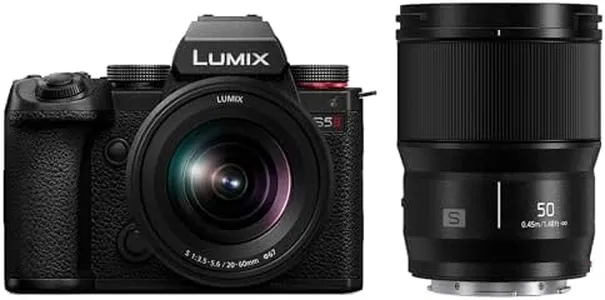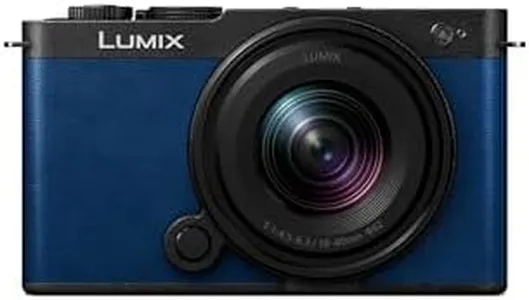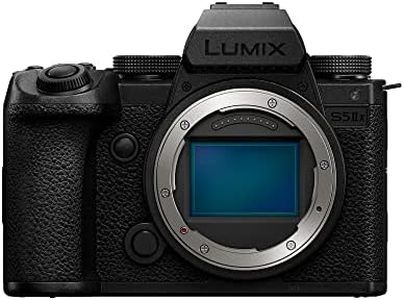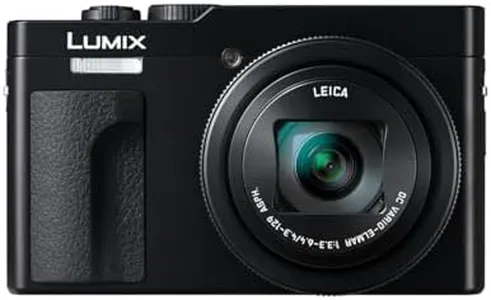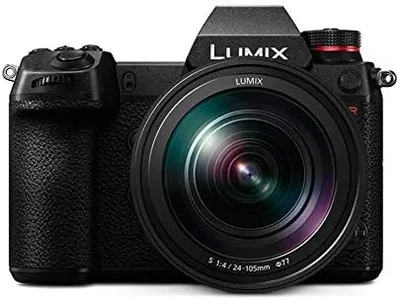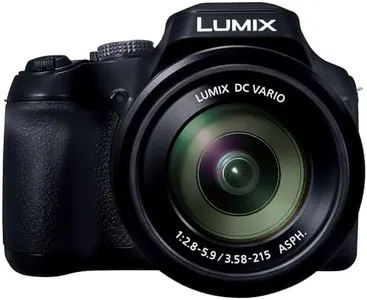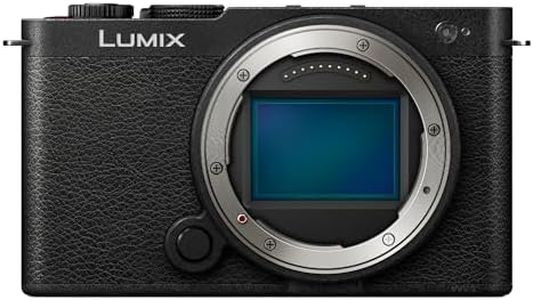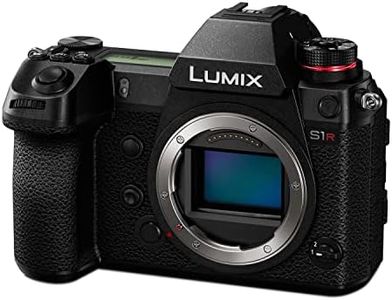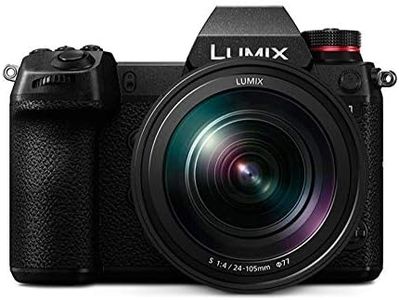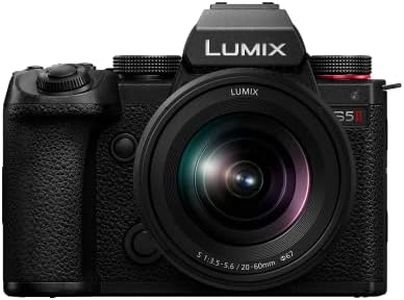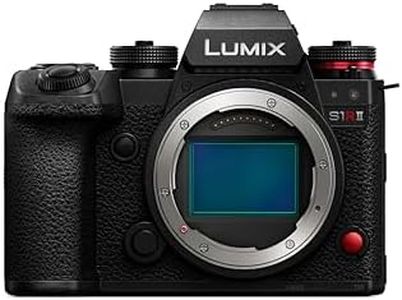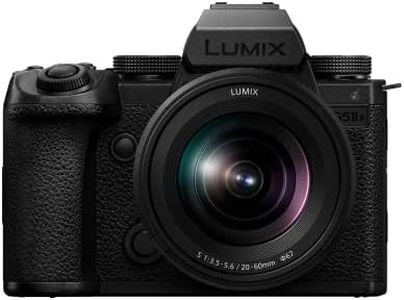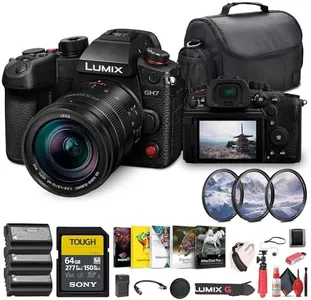10 Best Panasonic Lumix Cameras 2026 in the United States
Our technology thoroughly searches through the online shopping world, reviewing hundreds of sites. We then process and analyze this information, updating in real-time to bring you the latest top-rated products. This way, you always get the best and most current options available.

Our Top Picks
Winner
Panasonic LUMIX S5II Mirrorless Camera, 24.2MP Full Frame, Phase Hybrid AF, Active I.S. Technology, Unlimited Recording, 20-60mm F3.5-5.6 & 50mm F1.8 L Mount Lenses, LUMIX Camera - DC-S5M2WK
Most important from
220 reviews
The Panasonic LUMIX S5II is a versatile mirrorless camera that caters well to both professional photographers and videographers. With its 24.2MP full-frame sensor, it captures high-quality images with impressive detail. The camera's Phase Hybrid Autofocus system is fast and reliable, performing admirably even in challenging lighting conditions, which is a big plus for dynamic shooting scenarios. The Active I.S. technology elevates the image stabilization, making it particularly suitable for handheld video recording and walking shots.
A standout feature is its unlimited video recording capability, enabled by an efficient heat management system. This allows for extended shooting sessions without the worry of overheating, making it an excellent choice for event videography or long takes. The camera supports 14+ stop V-Log/V-Gamut capture, offering rich and vibrant color grading options right in-camera, which many creators will find beneficial.
However, the S5II does have a few drawbacks. While it’s packed with features, its weight (740 grams) may be cumbersome for some users, especially those who prefer lightweight gear for travel. The battery life is decent but could be improved, particularly during extended video recording sessions. Additionally, the camera may feel overwhelming for beginners due to its professional-grade features and controls. In terms of ergonomics, the build quality is robust and water-resistant, which adds to its durability for outdoor shoots. The two lens kit (20-60mm and 50mm) offers a good range for various photography styles, but some users might find the lens options a bit limited for specialized needs.
The Panasonic LUMIX S5II is a powerful hybrid camera that excels in both photography and videography, making it suitable for professionals and enthusiasts. Potential users should consider the weight and learning curve associated with its advanced features.
Most important from
220 reviews
Panasonic LUMIX S9 Full-Frame Mirrorless Camera with S 18-40mm F4.5-6.3 Lens, Compact, Lightweight Body, Perfect for Social Media and Travel, DC-S9NA
Most important from
86 reviews
The Panasonic LUMIX S9 is a full-frame mirrorless camera, ideal for social media enthusiasts and travelers due to its compact and lightweight design. The camera features a 24.2 MP sensor which ensures high-quality images, even in low light conditions. This makes it great for capturing stunning photos and videos on the go. The included S 18-40mm F4.5-6.3 lens is versatile, though the aperture may limit performance in very low light situations.
The LUMIX S9 has excellent image stabilization, which helps in maintaining clarity in handheld shots and while recording video. The ultra-fast Wi-Fi connection is a big plus, making it easy to transfer content to your smartphone for quick sharing on social media platforms. The camera also offers the ability to apply real-time LUTs, which is fantastic for those who want to apply professional color grades instantly.
One downside could be its battery life, which can be a limitation during extended use without access to a charger. Additionally, the autofocus system, while competent, might not be as advanced as those found in higher-end models. The build quality and ergonomics are solid, making it comfortable to handle for prolonged periods. The Panasonic LUMIX S9 is a well-rounded camera that balances portability with professional-grade features, making it an excellent choice for content creators on the move.
Most important from
86 reviews
Panasonic LUMIX S5IIX Mirrorless Camera, 24.2MP Full Frame with Phase Hybrid AF, New Active I.S. Technology, 5.8K Pro-Res, RAW Over HDMI, IP Streaming - DC-S5M2XBODY
Most important from
148 reviews
The Panasonic LUMIX S5IIX is a capable full-frame mirrorless camera with a 24.2MP sensor that delivers detailed and natural images, suitable for enthusiasts and professionals wanting high-quality photos and videos. Its standout feature is the Phase Hybrid Autofocus system with 779 focus points, which is fast and accurate, helping keep moving subjects sharp even in tricky lighting. This makes it great for action or event photography.
The camera also includes powerful sensor-shift image stabilization combined with Panasonic’s Active I.S. technology, which is particularly helpful for steady handheld video and walking shots. Video capabilities are impressive, offering 5.8K Pro-Res recording, RAW output via HDMI, and unlimited recording time thanks to a built-in cooling system. This makes it a solid choice for videographers and livestreamers. The camera supports Leica L mount lenses, providing good lens compatibility, and has a 3-inch articulating touchscreen that is bright and responsive.
Battery life is reasonable for a camera with these features, though heavy video use may require extra batteries. Build quality is solid with water resistance, but the body weighs around 740 grams, which is a bit heavier than some competitors, something to consider if you want a very lightweight setup. Some users may find the extensive features slightly complex at first, but for those seeking a versatile, hybrid camera that performs well in both stills and video, the S5IIX is a strong option.
Most important from
148 reviews
Buying Guide for the Best Panasonic Lumix Cameras
When choosing a Panasonic Lumix camera, it's important to consider your specific needs and how you plan to use the camera. Whether you're a professional photographer, a hobbyist, or someone who just wants to capture memories, understanding the key specifications will help you make an informed decision. Here are some key specs to consider and how to navigate them to find the best fit for you.FAQ
Most Popular Categories Right Now
